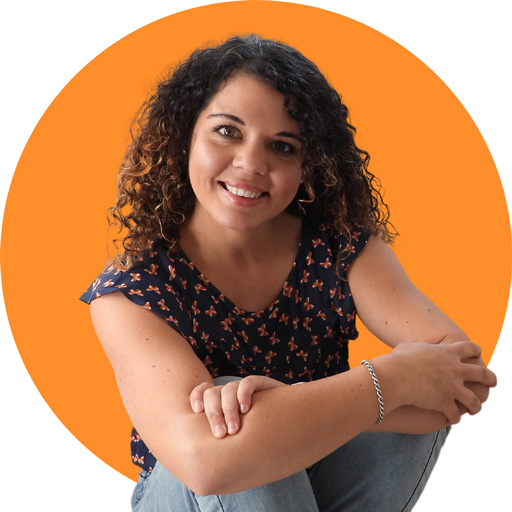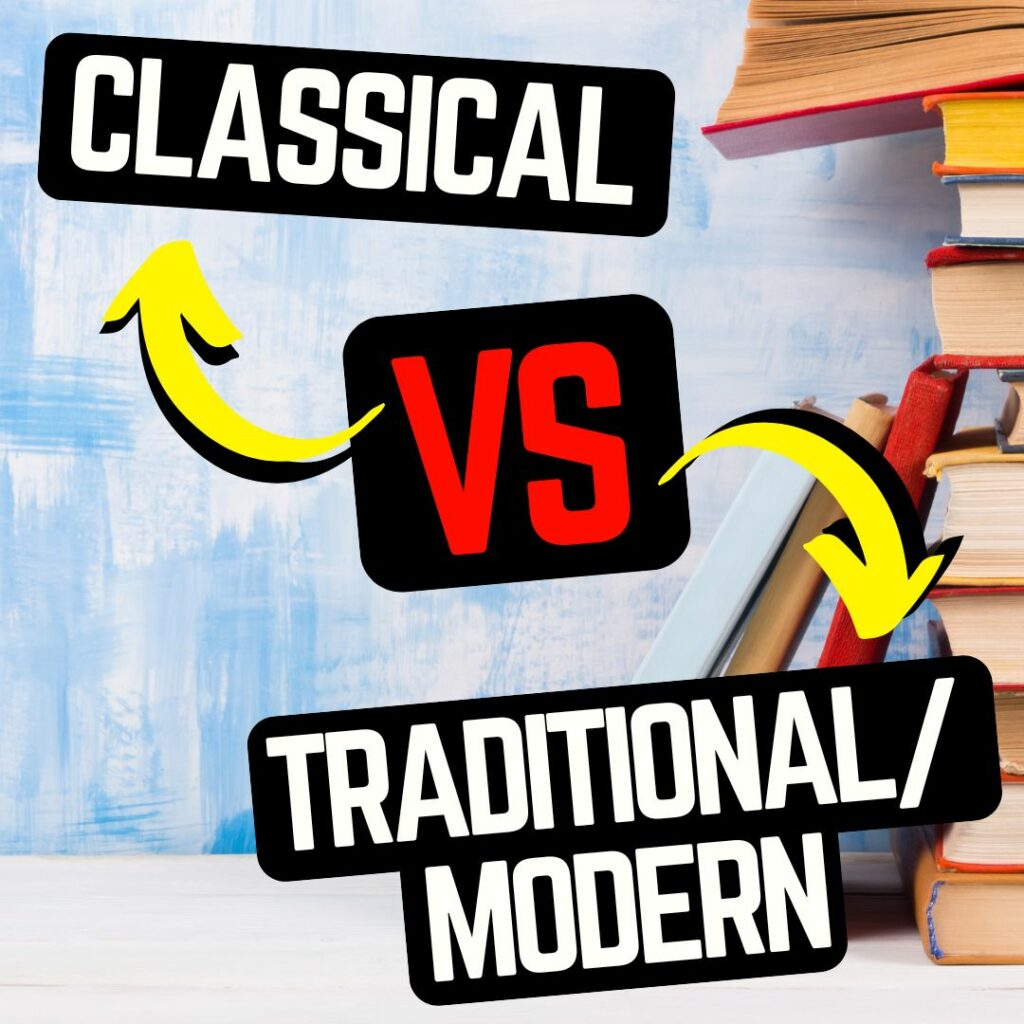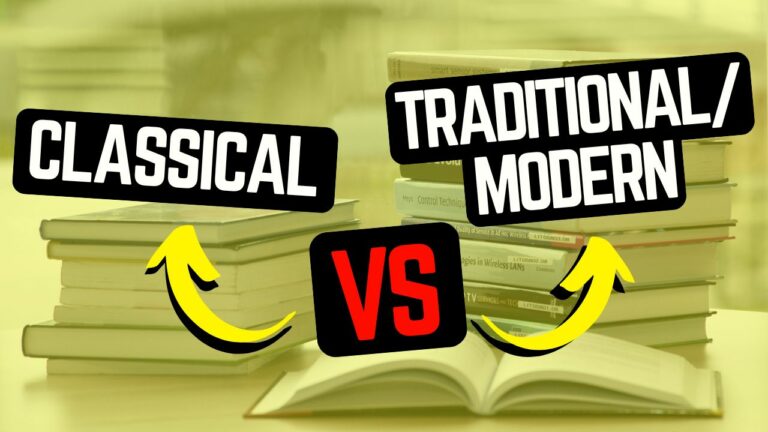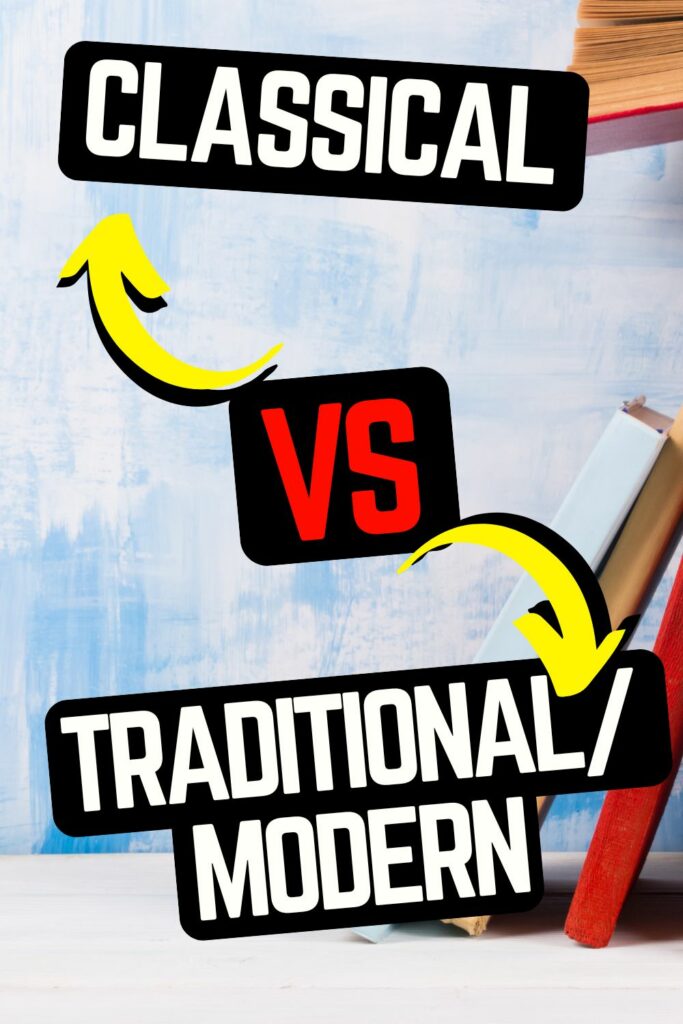Education is a powerful tool that nurtures our minds and fuels our growth. As we delve into the vast landscape of educational practices, it becomes intriguing to examine the various approaches that have shaped generations. Among these approaches, classical and traditional education emerge as two prominent paths worth exploring. In this article, we will journey to understand the nuances of classical education vs traditional education, unraveling their unique characteristics and shedding light on frequently asked questions about these two methods. So, let’s embark on this enlightening quest for knowledge!

I hope you enjoy reading this blog post. If you want to do my course on how to homeschool, click here.
If you like classical education, I’ll discuss various classical homeschool curriculum options you can get further down the page (including a free consultation with Veritas Press).

Affiliate links are used in this post.
What is Classical Education?
Classical education has its roots in ancient Greece and Rome.
It focuses on the liberal arts, subjects that give a well-rounded education.
The “trivium” and the “quadrivium” are two important parts of classical education.
The trivium includes developmental stages children pass through.
These stages are called the:
These stages help students become better at language, reasoning, and persuasive communication.
The quadrivium covers arithmetic, geometry, music, and astronomy, giving students a foundation in math, science, and the arts.
What is Traditional Education?
Traditional education is a more familiar approach that has become popular over the last 100 years.
It often involves a teacher leading the class and students learning through lectures and textbooks.
Traditional education focuses on core subjects like math, science, and language arts.
The goal is to teach students essential knowledge and skills while promoting discipline and conformity.
Students don’t focus on critical thinking as much as devouring knowledge that is considered essential by government and teaching bodies.
How Do They Differ?
While both classical and traditional education aims to educate students, there are some key differences between the two.
- Curriculum: Classical education emphasizes the liberal arts and a well-rounded education, whereas traditional education focuses more on ‘core’ subjects and foundational skills.
- Teaching Methodologies: Classical education often encourages active participation and discussion through the Socratic method. On the other hand, traditional education relies more on lectures and structured lessons.
What Are the Benefits of Classical Education?
Classical education nurtures critical thinking, effective communication, and a love for learning.
By focusing on the liberal arts, it helps students develop language proficiency, logical reasoning, and persuasive abilities.
It also encourages independent thinking and intellectual curiosity.
What Are the Benefits of Traditional Education?
Traditional education provides students with a strong academic foundation as far as knowledge goes.
Indeed the grammar stage of classical education and the general approach used in traditional/modern education is almost indistinguishable in some curriculum programs. Dorothy Sayers said this about the Classical Education vs Traditional Education:
So far (except, of course, for the Latin), our curriculum contains nothing that departs very far from common practice. The difference will be felt rather in the attitude of the teachers, who must look upon all these activities less as “subjects” in themselves than as a gathering together of material for use in the next part of the Trivium. What that material actually is, is only of secondary importance; but it is as well that anything and everything which can usefully be committed to memory should be memorised at this period, whether it is immediately intelligible or not. The modern tendency is to try and force rational explanations on a child’s mind at too early an age. Intelligent questions, spontaneously asked, should, of course, receive an immediate and rational answer; but it is a great mistake to suppose that a child cannot readily enjoy and remember things that are beyond its power to analyse—particularly if those things have a strong imaginative appeal (as, for example, Kubla Khan), an attractive jingle (like some of the memory rhymes for Latin genders), or an abundance of rich, resounding polysyllables (like the Quicunque Vult). – Dorothy Sayers, Lost Tools of Learning, p. 12.
Traditional education rarely seeks to teach logic and even more rarely seeks to teach presenting the facts logically using wisdom (which is what the rhetoric stage aims to do).
By focusing on core subjects, it ensures that students gain essential knowledge and skills as as deemed important by specific teaching bodies and the government.
Classical Education vs Traditional Education
The difference between classical and traditional education is highlighted when one considers the freedom children are encouraged to pursue in education in the rhetoric stage. Indeed, Sayers talks about the rhetoric stage of classical education when she says,
It is difficult to map out any general syllabus for the study of Rhetoric: a certain freedom is demanded. – Dorothy Sayers, Lost Tools of Learning, p. 16.
Classical Christian education also reverences theology among all other subjects and elevates that as the subject that ties all others together. It joins the dots and helps relate apparently separate subjects. Sayers said this about it:
Dialectic will have shown all branches of learning to be inter-related, so Rhetoric will tend to show that all knowledge is one. To show this, and show why it is so, is pre-eminently the task of the Mistress-science. – Dorothy Sayers, Lost Tools of Learning, p. 16.
Classical education vs traditional education shows its differences no more than when its aims are considered. A classical education seeks to promote critical thinking and appreciation of logical perspectives. Sayers said we should be:
…concerned only with the proper training of the mind to encounter and deal with the formidable mass of undigested problems presented to it by the modern world. For the tools of learning are the same, in any and every subject; and the person who knows how to use them will, at any age, get the mastery of a new subject in half the time and with a quarter of the effort expended by the person who has not the tools at his command. To learn six subjects without remembering how they were learnt does nothing to ease the approach to a seventh; to have learnt and remembered the art of learning makes the approach to every subject an open door. – Dorothy Sayers, Lost Tools of Learning, p. 17.
Classical educators don’t merely convey facts but set students up for the countless social adjustments they need to make through their lives. Douglas Wilson said this about it:
“Education, according to Comenius, is not merely the training of the child at school or in the home; it is a process affecting man’s whole life and the countless social adjustments he must make.” Education is for life. It cannot be limited to book learning, and it is not restricted to the hours between eight and three. As such, we would add, it is inescapably religious. The Case for Classical Christian Education, p. 125.
Poll-parrot. At this stage children love to chant, memorize, and recite. When they want to take on data, we have them take on data. Most modern educators stumble at this point because of their antipathy to “rote learning.” They are chronologically troubled over nothing. Rote learning is a poor substitute for education when it is applied at the wrong place. But when accumulation of facts is a joy and a delight to a child, and quite a bit of it has to be done in any case, why not do it [in the grammar stage of classical education]? In the American educational system, this stage is (roughly speaking) the elementary years – starting to taper off in sixth grade. – Douglas Wilson, The Case for Classical Christian Education, p. 136.
More on Classical Education vs Traditional Education by Sayers
I recommend everyone reads the essay The Lost Tools of Learning if they’re interested in classical education. However, if that isn’t an option for you, read the experts below that will be helpful:
- What use is it to pile task on task and prolong the days of labour, if at the close the chief object is left unattained? It is not the fault of the teachers—they work only too hard already. The combined folly of a civilisation that has forgotten its own roots is forcing them to shore up the tottering weight of an educational structure that is built upon sand. They are doing for their pupils the work which the pupils themselves ought to do. For the sole true end of education is simply this: to teach men how to learn for themselves; and whatever instruction fails to do this is effort spent in vain. – Dorothy Sayers, Lost Tools of Learning, p. 18.
- The disrepute into which Formal Logic has fallen is entirely unjustified; and its neglect is the root cause of nearly all those disquieting symptoms which we may note in the modern intellectual constitution. Logic has been discredited, partly because we have fallen into a habit of supposing that we are conditioned almost entirely by the intuitive and the unconscious. – Dorothy Sayers, Lost Tools of Learning, p. 13.
- It is, of course, quite true that bits and pieces of the mediæval tradition still linger, or have been revived, in the ordinary school syllabus of today. Some knowledge of grammar is still required when learning a foreign language— perhaps I should say, “is again required”; for during my own lifetime we passed through a phase when the teaching of declensions and conjugations was considered rather reprehensible, and it was considered better to pick these things up as we went along. School debating societies flourish; essays are written; the necessity for “self-expression” is stressed, and perhaps even over-stressed. But these activities are cultivated more or less in detachment, as belonging to the special subjects in which they are pigeon-holed rather than as forming one coherent scheme of mental training to which all “subjects” stand in a subordinate relation. “Grammar” belongs especially to the “subject” of foreign languages, and essay-writing to the “subject” called “English”; while Dialectic has become almost entirely divorced from the rest of the curriculum, and is frequently practiced unsystematically and out of school hours as a separate exercise, only very loosely related to the main business of learning. Taken by and large, the great difference of emphasis between the two conceptions holds good: modern education concentrates on teaching subjects, leaving the method of thinking, arguing, and expressing one’s conclusions to be picked up by the scholar as he goes along; mediæval education concentrated on first forging and learning to handle the tools of learning, using whatever subject came handy as a piece of material on which to doodle until the use of the tool became second nature. – Dorothy Sayers, Lost Tools of Learning, pp. 7-8.
- Scorn in plenty has been poured out upon the mediæval passion for hair-splitting [i.e. how many angels can dance on the head of a pin]: but when we look at the shameless abuse made, in print and on the platform, of controversial expressions with shifting and ambiguous connotations, we may feel it in our hearts to wish that every reader and hearer had been so defensively armored by his education as to be able to cry: Distinguo. – Dorothy Sayers, Lost Tools of Learning, p. 7.
- I recognise in myself three states of development. These, in a rough-and-ready fashion, I will call the Poll-parrot, the Pert, and the Poetic—the latter coinciding, approximately, with the onset of puberty. The Poll-parrot stage is the one in which learning by heart is easy and, on the whole, pleasurable; whereas reasoning is difficult and, on the whole, little relished. At this age one readily memorises the shapes and appearances of things; one likes to recite the number-plates of cars; one rejoices in the chanting of rhymes and the rumble and thunder of unintelligible polysyllables; one enjoys the mere accumulation of things. The Pert Age, which follows upon this (and, naturally, overlaps it to some extent) is only too familiar to all who have to do with children: it is characterised by contradicting, answering-back, liking to “catch people out” (especially one’s elders), and the propounding of conundrums (especially the kind with a nasty verbal catch in them). Its nuisance-value is extremely high. It usually sets in about the Lower Fourth. The Poetic Age is popularly known as the “difficult” age. It is self-centered; it yearns to express itself; it rather specializes in being misunderstood; it is restless and tries to achieve independence; and, with good luck and good guidance, it should show the beginnings of creativeness, a reaching-out towards a synthesis of what it already knows, and a deliberate eagerness to know and do some one thing in preference to all others. Now it seems to me that the lay-out of the Trivium adapts itself with a singular appropriateness to these three ages: Grammar to the Poll-parrot, Dialectic to the Pert, and Rhetoric to the Poetic Age. – Dorothy Sayers, Lost Tools of Learning, p. 9.
How to Get a Classical Education Curriculum for a Homeschool
If you want to use the classical homeschooling method in your homeschool, you don’t have to reinvent the wheel and create your own curriculum.
Instead, there are plenty of decent classical Christian education options around, such as:
- Veritas Press – great if you want more of an online program – book a free consultation with them here.
- Memoria Press – great if you prefer a mailable program
- Compass Classroom – an extremely affordable classical program with a hint of Charlotte Mason
- Classical Conversations – includes a homeschooling co-op focus
- Classical Academic Press – customize your curriculum with this one
- A Well-Trained Mind
- Tapestry of Grace – Unit Studies approach to a Christian curriculum
I’ve looked into several of these options, which can be found reviewed here.
Further Reading on Classical Education
I can’t recommend Dorothy Sayer’s Lost Tools of Learning more highly. It is a must-read for anyone seriously considering giving their children a classical education. This is because it’s the basis of most Christian classical education today.
Another great book that will help you understand Classical Christian education today (albeit in a school context), is Douglas Wilson’s The Case for Classical Christian Education. Wilson bases his arguments heavily on Sayer’s writings but adds a lot of flesh to the bones.
As you can see I’ve quoted extensively from both texts in this article as I’ve wanted to get to the original sources of modern classical Christian education.
Subscribe to How to Homeschool (my Youtube channel!)
Have you caught the homeschooling bug?
Eager to delve deeper into the realm of unconventional education?
Well, my curious comrades, rejoice!
There are splendid avenues awaiting your exploration.
Firstly, hop on over to my YouTube channel, where a treasure trove of homeschooling wisdom awaits. From practical tips to delightful anecdotes, I unravel the mysteries of homeschooling with a touch of wit and wisdom.
Subscribe, hit that notification bell, and embark on an enlightening journey with me.
Enroll in the Homeschool Parenting Program
For those yearning for a comprehensive guide to homeschooling, look no further than my Homeschool Parenting Program.
This illustrious online course will equip you with the knowledge, strategies, and confidence to navigate the exhilarating world of homeschooling like a seasoned pro.
Enroll today and unlock the door to extraordinary educational possibilities.
Conclusion: Classical Education vs Traditional Education: The Difference
In conclusion, classical education and traditional education have distinct philosophies and approaches. Classical education emphasizes the liberal arts, critical thinking, and effective communication, while traditional education focuses on core subjects and foundational skills. Each approach has its own benefits, and the choice depends on the individual’s educational goals and preferences.




